贷款通则中英文版
- 格式:docx
- 大小:59.98 KB
- 文档页数:22
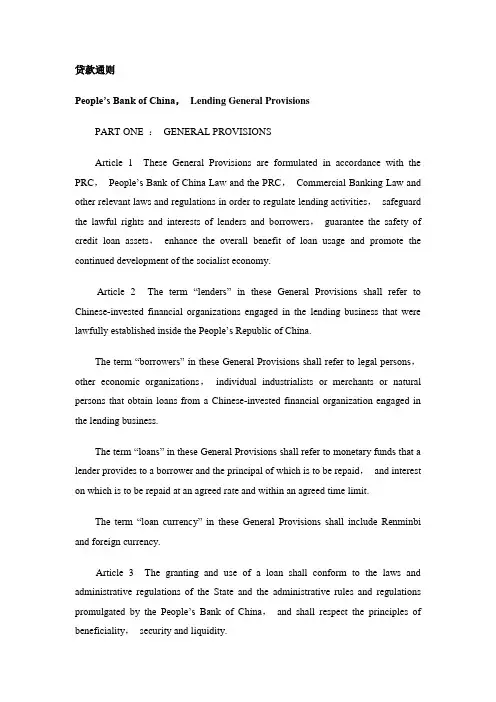
贷款通则People’s Bank of China,Lending General ProvisionsPART ONE :GENERAL PROVISIONSArticle 1These General Provisions are formulated in accordance with the PRC,People’s Bank of China Law and the PRC,Commercial Banking Law and other relevant laws and regulations in order to regulate lending activities,safeguard the lawful rights and interests of lenders and borrowers,guarantee the safety of credit loan assets,enhance the overall benefit of loan usage and promote the continued development of the socialist economy.Article 2The term “lenders” in these General Provisions shall refer to Chinese-invested financial organizations engaged in the lending business that were lawfully established inside the People’s Republic of China.The term “borrowers” in these General Provisions shall refer to legal persons,other economic organizations,individual industrialists or merchants or natural persons that obtain loans from a Chinese-invested financial organization engaged in the lending business.The term “loans” in these General Provisions shall refer to monetary funds that a lender provides to a borrower and the principal of which is to be repaid,and interest on which is to be repaid at an agreed rate and within an agreed time limit.The term “loan currency” in these General Provisions shall include Renminbi and foreign currency.Article 3The granting and use of a loan shall conform to the laws and administrative regulations of the State and the administrative rules and regulations promulgated by th e People’s Bank of China,and shall respect the principles of beneficiality,security and liquidity.Article 4Lending and borrowing activities between a borrower and a lender shall abide by the principle of equality,voluntariness,fairness and honesty and trustworthiness.Article 5In the development of lending business,lenders shall abide by the principle of fair competition and close co-operation,and may not engage in unfair competition.Article 6The People’s Bank of China and its branches shal l be the regulatory authorities for the implementation of the Lending General Provisions.PART TWO TYPES OF LOANSArticle 7Loans for one’s own account,entrusted loans and specially designated loans:“Loans for one’s own account” shall refer to loans granted on one’s own initiative using funds raised by lawful means,the risk of which shall be borne by the lender,and of which the principal and interest shall be collected by the lender.“Entrusted loans” shall refer to loans for which the funds are provided by an entrusting party such as a government department, a unit of an enterprise or institution,or an individual,of which the use is supervised and the recovery assisted by the lender (being the entrusted party)in accordance with the loan beneficiary,purpose,amount,term,interest rate,etc. determined by the entrusting party. The lender (being the entrusted party)receives only a handling fee but does not bear the loan risk.“Specially designated loans” shall refer to loans which a wholly S tate-owned commercial bank is ordered to grant upon approval by the State Council,and after appropriate remedial measures are adopted to cover losses that may arise from such a loan.Article 8Short-term,medium-term and long-term loans:“Short-term l oan” shall refer to loan with a term of one year or less (including one year)。
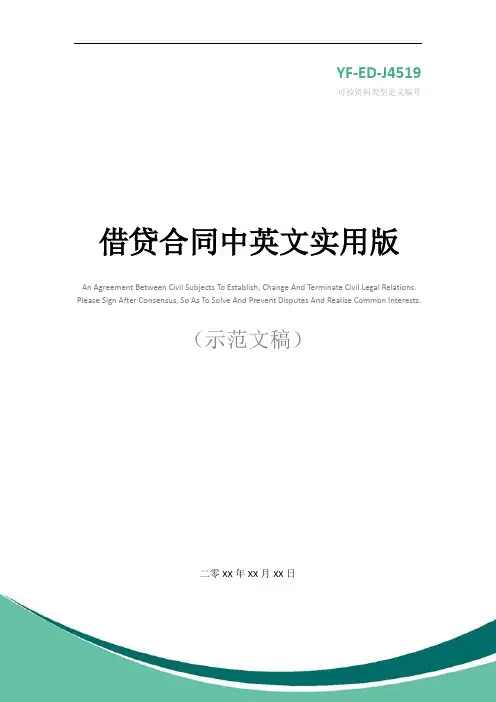
YF-ED-J4519可按资料类型定义编号借贷合同中英文实用版An Agreement Between Civil Subjects To Establish, Change And Terminate Civil Legal Relations. Please Sign After Consensus, So As To Solve And Prevent Disputes And Realize Common Interests.(示范文稿)二零XX年XX月XX日借贷合同中英文实用版提示:该合同文档适合使用于民事主体之间建立、变更和终止民事法律关系的协议。
请经过一致协商再签订,从而达到解决和预防纠纷实现共同利益的效果。
下载后可以对文件进行定制修改,请根据实际需要调整使用。
借贷合同范本【中英文】贷款方(Lender):身份证件号码(IDNumber.):地址(Address):电话(Tel):借款方(Borrower):法定代表人(Representative):职务(Title):地址(Address):电话(Tel):借款方是一家从事生产销售喷砂和抛光研磨纤维石产品;(砂石品业务)的公司:借款方因生产经营需要,向贷款方借款。
双方本着互惠互利的目的,友好协商,特制订本合同。
第一条借款金额Article1AmountofLoan借款金额280,000美元(大写:贰拾捌万美元)贷款方在签订本书面合同之前,已向借款方提供280,000美元贷款。
借款方在此确认已经收到贷款方通过银行转账方式提供的280,000美元贷款。
第二条借款用途Article2ScopeforUse本合同所约定的贷款仅用于借款方生产销售砂石品业务,不得挪作它用。
第三条利率及还款期Article3InterestandTermRepayment1.如果借款方在合同约定的还期限内还清借款,贷款方则不收取借款利息。
2.借款方应按照以下还款期向贷款方偿还借款:在本合同签订之日起十二个月内偿还借款美元;在本合同签订之日起二十四个月内偿还借款美元;在合同签订之日起三十六个月内偿还借款美元。
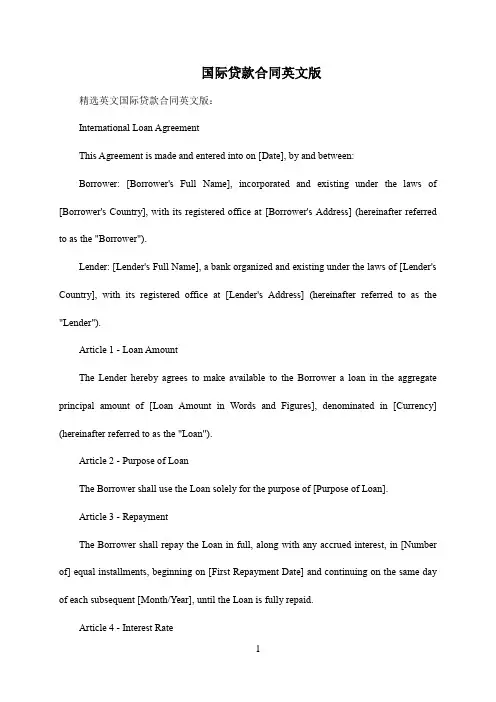
国际贷款合同英文版精选英文国际贷款合同英文版:International Loan AgreementThis Agreement is made and entered into on [Date], by and between:Borrower: [Borrower's Full Name], incorporated and existing under the laws of [Borrower's Country], with its registered office at [Borrower's Address] (hereinafter referred to as the "Borrower").Lender: [Lender's Full Name], a bank organized and existing under the laws of [Lender's Country], with its registered office at [Lender's Address] (hereinafter referred to as the "Lender").Article 1 - Loan AmountThe Lender hereby agrees to make available to the Borrower a loan in the aggregate principal amount of [Loan Amount in Words and Figures], denominated in [Currency] (hereinafter referred to as the "Loan").Article 2 - Purpose of LoanThe Borrower shall use the Loan solely for the purpose of [Purpose of Loan].Article 3 - RepaymentThe Borrower shall repay the Loan in full, along with any accrued interest, in [Number of] equal installments, beginning on [First Repayment Date] and continuing on the same day of each subsequent [Month/Year], until the Loan is fully repaid.Article 4 - Interest RateThe Loan shall bear interest at the rate of [Interest Rate]% per annum, calculated and payable in accordance with the terms and conditions specified in this Agreement.Article 5 - Representations and WarrantiesThe Borrower hereby represents and warrants to the Lender that:(a) The Borrower is a duly organized and validly existing entity under the laws of [Borrower's Country].(b) The Borrower has the full power and authority to execute and deliver this Agreement and to perform its obligations under this Agreement.(c) The execution and delivery of this Agreement and the performance of the Borrower's obligations under this Agreement do not violate any law, rule, regulation, order, judgment, or agreement applicable to the Borrower.Article 6 - Events of DefaultAn event of default shall occur under this Agreement if:(a) The Borrower fails to pay any amount due under this Agreement when due and payable.(b) The Borrower breaches any of its representations, warranties, or covenants under this Agreement.(c) Any material adverse change occurs in the financial condition or operations of the Borrower.Article 7 - Governing Law and JurisdictionThis Agreement shall be governed by and construed in accordance with the laws of[Governing Law Country]. Any dispute arising out of or in connection with this Agreement shall be submitted to the exclusive jurisdiction of the courts of [Governing Law Country].Article 8 - MiscellaneousThis Agreement constitutes the entire agreement between the parties and supersedes all prior agreements and understandings, whether written or oral, relating to the subject matter of this Agreement.IN WITNESS WHEREOF, the parties have executed this Agreement as of the date first written above.BORROWER:[Borrower's Full Name]By: _____________________________Name: [Borrower's Authorized Representative's Name]Title: [Borrower's Authorized Representative's Title]LENDER:[Lender's Full Name]By: _____________________________Name: [Lender's Authorized Representative's Name]Title: [Lender's Authorized Representative's Title]Note: This is a sample template for an international loan agreement and should be tailored to the specific needs and circumstances of the parties involved. It is recommended to consult with legal professionals for advice and assistance in drafting and executing suchagreements.中文对照翻译:国际贷款协议本协议由以下双方于【日期】签订:借款人:【借款人全称】,根据【借款人所在国】法律成立并存续,注册办事处位于【借款人地址】(以下简称“借款人”)。
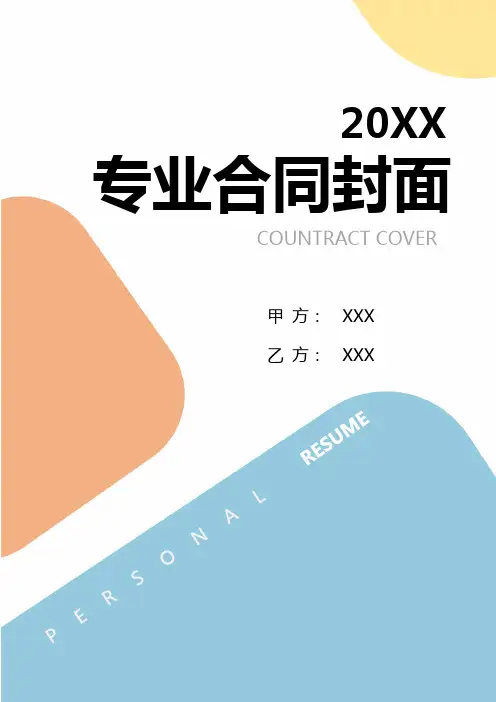
20XX 专业合同封面COUNTRACT COVER甲方:XXX乙方:XXX中英外债融资贷款协议规范文档(2024版)一本合同目录一览一、定义与解释1.1 术语定义1.2 解释规则二、贷款金额与用途2.1 贷款金额2.2 贷款用途三、贷款期限与还款方式3.1 贷款期限3.2 还款方式四、利率与费用4.1 贷款利率4.2 相关费用五、担保与抵押5.1 担保方式5.2 抵押物描述六、违约责任6.1 违约情形6.2 违约责任七、争议解决7.1 争议类型7.2 解决方式八、合同的生效、变更与终止8.1 合同生效条件8.2 合同变更8.3 合同终止九、保密条款9.1 保密内容9.2 泄露后果十、适用法律与管辖10.1 适用法律10.2 争议管辖十一、其他条款11.1 双方约定11.2 附加条款十二、合同附件12.1 附件清单12.2 附件效力十三、合同的签署与备案13.1 签署程序13.2 备案要求十四、双方信息与联系方式14.1 双方信息14.2 联系方式第一部分:合同如下:一、定义与解释1.1 术语定义1.1.1 本合同:指由甲方(贷款人)与乙方(借款人)签订的《中英外债融资贷款协议规范文档(2024版)》。
1.1.2 甲方:指贷款人,即提供贷款的金融机构。
1.1.3 乙方:指借款人,即接受贷款的企业或个人。
1.1.4 贷款:指甲方根据本合同约定,向乙方提供的资金支持。
1.1.5 贷款人:指具有贷款资格的金融机构。
1.1.6 借款人:指需要贷款的企业或个人。
1.1.7 外债:指借款人在境外借款,以及发行外币债券、外币股票等筹集的外部资金。
1.1.8 贷款用途:指乙方使用贷款资金的目的和方向,包括但不限于投资、经营、偿还债务等。
1.1.9 贷款期限:指贷款资金的借用期限,自贷款发放之日起至贷款全部偿还之日止。
1.1.10 还款:指乙方按照本合同约定的期限和方式,向甲方偿还贷款本金和利息的行为。
1.1.11 利率:指贷款的利率,包括固定利率和浮动利率。
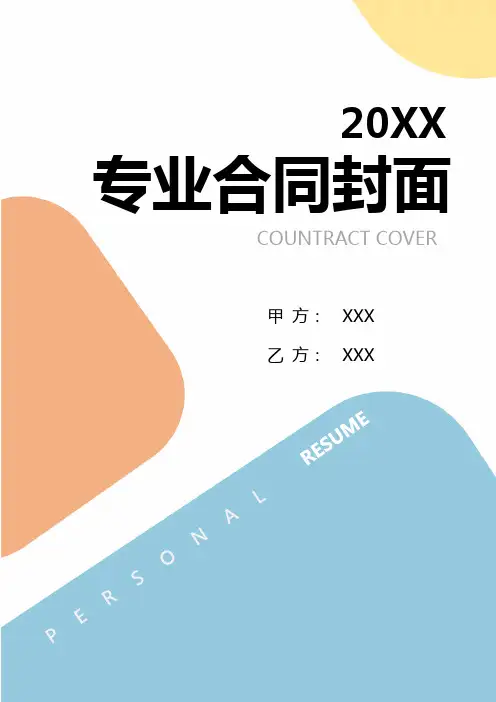
20XX 专业合同封面COUNTRACT COVER甲方:XXX乙方:XXX2024年国际个人借款协议中英文本版B版本合同目录一览第一条定义与解释1.1 合同术语1.2 定义1.3 解释第二条合同双方的权益与义务2.1 借款人的权益与义务2.2 贷款人的权益与义务第三条贷款金额与用途3.1 贷款金额3.2 贷款用途第四条贷款期限与还款方式4.1 贷款期限4.2 还款方式第五条利率与费用5.1 利率5.2 费用第六条担保与抵押6.1 担保6.2 抵押第七条违约与救济7.1 违约情形7.2 救济措施第八条争议解决8.1 争议解决方式8.2 适用法律第九条合同的生效、变更与终止9.1 合同生效条件9.2 合同变更9.3 合同终止第十条保密条款10.1 保密义务10.2 例外情况第十一条第三方受益11.1 第三方受益人11.2 第三方权益第十二条强制性规定12.1 适用法律12.2 合规性第十三条合同附件13.1 附件列表13.2 附件内容第十四条其他条款14.1 其他事项14.2 补充条款第一部分:合同如下:第一条定义与解释1.1 合同术语本合同中下列术语的含义如下:(1)借款人:指需要向贷款人借入资金的一方,即本合同的甲方。
(2)贷款人:指向借款人提供贷款资金的一方,即本合同的乙方。
(3)贷款金额:指乙方同意向甲方提供的贷款总额。
(4)贷款期限:指贷款资金的借用期限,自贷款发放之日起至还清贷款本息之日止。
(5)利率:指贷款期间借款人应支付给贷款人的利息率。
(6)费用:指借款人在贷款期间应支付给贷款人的各项费用,包括但不限于手续费、评估费、担保费等。
1.2 定义(1)本合同:指双方签署的《2024年国际个人借款协议中英文本版B版》。
(2)交易日:指双方达成贷款意向并签署本合同的日期。
(3)借入资金:指甲方从乙方借用的资金总额,包括本金和利息。
(4)还款:指甲方按照本合同约定的方式和期限,向乙方偿还借入资金本金和利息的行为。
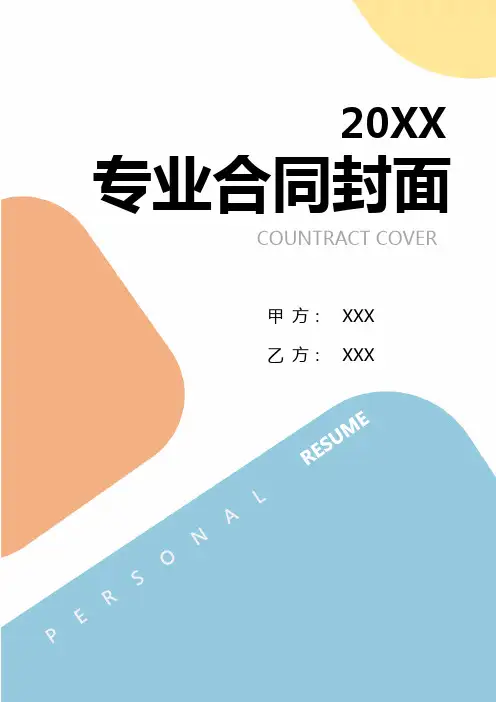
20XX 专业合同封面COUNTRACT COVER甲方:XXX乙方:XXX2024版商业贷款协议中英文对照一本合同目录一览1. 第一条贷款类型与金额1.1 第一层级的详细内容1.2 第二层级的详细内容1.3 第三层级的详细内容2. 第二条贷款期限2.1 第一层级的详细内容2.2 第二层级的详细内容2.3 第三层级的详细内容3. 第三条贷款利率3.1 第一层级的详细内容3.2 第二层级的详细内容3.3 第三层级的详细内容4. 第四条还款方式4.1 第一层级的详细内容4.2 第二层级的详细内容4.3 第三层级的详细内容5. 第五条还款义务5.1 第一层级的详细内容5.2 第二层级的详细内容5.3 第三层级的详细内容6. 第六条担保措施6.1 第一层级的详细内容 6.2 第二层级的详细内容6.3 第三层级的详细内容7. 第七条违约责任7.1 第一层级的详细内容 7.2 第二层级的详细内容7.3 第三层级的详细内容8. 第八条合同的变更与解除 8.1 第一层级的详细内容 8.2 第二层级的详细内容8.3 第三层级的详细内容9. 第九条争议解决9.1 第一层级的详细内容 9.2 第二层级的详细内容9.3 第三层级的详细内容10. 第十条适用法律10.1 第一层级的详细内容 10.2 第二层级的详细内容10.3 第三层级的详细内容11. 第十一条合同的生效11.1 第一层级的详细内容11.2 第二层级的详细内容11.3 第三层级的详细内容12. 第十二条合同的终止12.1 第一层级的详细内容12.2 第二层级的详细内容12.3 第三层级的详细内容13. 第十三条双方的权利与义务13.1 第一层级的详细内容13.2 第二层级的详细内容13.3 第三层级的详细内容14. 第十四条附则14.1 第一层级的详细内容14.2 第二层级的详细内容14.3 第三层级的详细内容第一部分:合同如下:第一条贷款类型与金额1.1 贷款类型:本贷款协议项下的贷款为商业贷款。
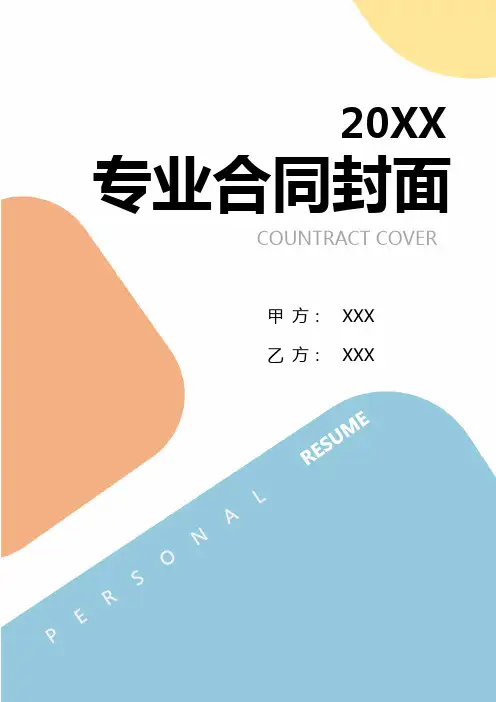
20XX 专业合同封面COUNTRACT COVER甲方:XXX乙方:XXX2024年国际个人借款协议中英文本版B版本合同目录一览1. 借款人信息1.1 借款人姓名1.2 借款人地址1.3 借款人联系方式2. 贷款人信息2.1 贷款人名称2.2 贷款人地址2.3 贷款人联系方式3. 借款金额与用途3.1 借款金额3.2 借款用途4. 借款期限4.1 借款期限4.2 还款日期5. 借款利率与费用5.1 借款利率5.2 手续费5.3 其他费用6. 还款方式6.1 还款方式6.2 还款账户信息7. 违约责任7.1 违约情形7.2 违约责任8. 合同的变更与解除8.1 变更条件8.2 解除条件9. 争议解决方式9.1 协商解决9.2 调解解决9.3 仲裁解决9.4 法律途径10. 合同的生效与终止 10.1 生效条件10.2 终止条件11. 保密条款11.1 保密内容11.2 保密期限12. 法律适用与争议解决 12.1 法律适用12.2 争议解决13. 其他条款13.1 借款人声明13.2 贷款人声明14. 附件14.1 借款申请表格14.2 借款人信用报告14.3 贷款人授权书14.4 其他相关文件第一部分:合同如下:第一条借款人信息1.2 借款人地址:中华人民共和国北京市朝阳区路号第二条贷款人信息2.2 贷款人地址:中华人民共和国上海市浦东新区路号第三条借款金额与用途3.1 借款金额:借款人向贷款人借款人民币壹拾万元整(¥100,000.00)3.2 借款用途:借款人需用此借款进行家庭装修第四条借款期限4.1 借款期限:自借款发放之日起算,为期两年(24个月)4.2 还款日期:借款人应于借款期限届满之次日,即两年后之日起的第一个月内,还清全部借款本金及利息第五条借款利率与费用5.1 借款利率:年利率为中国人民银行公布的同期贷款基准利率的1.1倍5.2 手续费:借款人应向贷款人支付借款金额的1%作为手续费5.3 其他费用:借款人在借款期间,如发生逾期等违约行为,应按照借款合同约定支付相应的违约金或罚息等第六条还款方式6.1 还款方式:借款人同意采取等额本息还款方式进行还款6.2 还款账户信息:借款人同意将还款金额划转到贷款人指定的银行账户内,具体账户信息如下:户名:账号:X银行:中国工商银行北京市分行第八条合同的变更与解除8.1 变更条件:借款合同的变更需经借款人与贷款人协商一致,并签订书面变更协议8.2 解除条件:借款合同的解除需经借款人与贷款人协商一致,并签订书面解除协议。
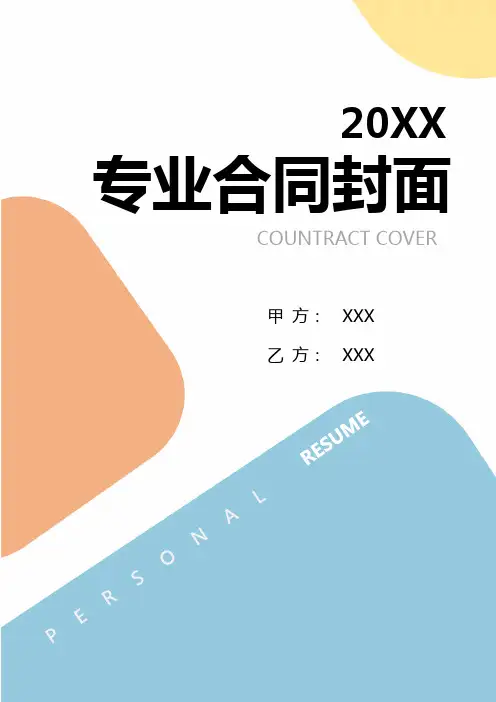
20XX 专业合同封面COUNTRACT COVER甲方:XXX乙方:XXX2024年金融借款服务合同中英文版版B版本合同目录一览1. 借款金额与用途1.1 借款金额1.2 借款用途2. 借款期限2.1 借款期限2.2 还款时间表3. 利率与费用3.1 借款利率3.2 相关费用4. 还款方式与条件4.1 还款方式4.2 还款条件5. 担保与抵押5.1 担保方式5.2 抵押物描述6. 违约责任6.1 违约情形6.2 违约后果7. 争议解决7.1 争议解决方式7.2 适用法律8. 合同的生效与终止8.1 合同生效条件8.2 合同终止条件9. 其他条款9.1 信息保密9.2 法律许可10. 借款人的权利与义务10.1 借款人的权利10.2 借款人的义务11. 贷款人的权利与义务11.1 贷款人的权利11.2 贷款人的义务12. 英文版合同的效力12.1 英文版合同的法律效力12.2 语言解释问题13. 附件13.1 附件描述14. 签署页14.1 签署人信息第一部分:合同如下:1. 借款金额与用途1.1 借款金额1.2 借款用途借款人应将借款金额用于【具体用途】,包括但不限于【具体事项】。
借款人不得将借款金额用于法律法规禁止的用途,否则贷款人有权立即收回全部借款。
2. 借款期限2.1 借款期限借款期限为【】年,自借款金额实际支付之日起算。
2.2 还款时间表借款人应按照下列还款时间表偿还借款本金及利息:【还款时间表】。
3. 利率与费用3.1 借款利率借款利率为【】%,按年计算。
3.2 相关费用借款人应支付给贷款人的相关费用包括但不限于:【相关费用】。
4. 还款方式与条件4.1 还款方式借款人应按照本合同约定的还款时间表和还款方式偿还借款本金及利息。
4.2 还款条件5. 担保与抵押5.1 担保方式借款人应提供【担保方式】作为借款的担保,包括但不限于:【担保措施】。
5.2 抵押物描述借款人将其拥有的【抵押物描述】抵押给贷款人,作为借款的担保。
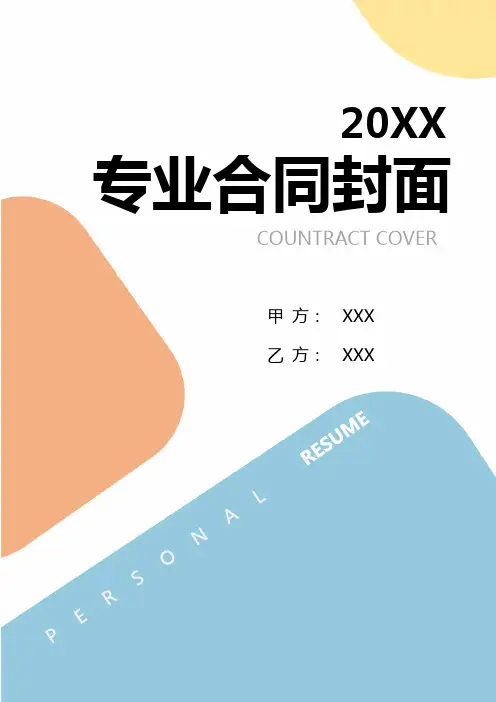
20XX 专业合同封面COUNTRACT COVER甲方:XXX乙方:XXX中英外债融资贷款协议规范文档(2024版)版本合同目录一览1. 定义与解释1.1 合同各方1.2 术语解释2. 贷款金额与用途2.1 贷款金额2.2 贷款用途3. 贷款期限与还款方式3.1 贷款期限3.2 还款方式4. 利率与费用4.1 贷款利率4.2 相关费用5. 担保与抵押5.1 担保方式5.2 抵押物6. 违约责任6.1 违约情形6.2 违约责任7. 争议解决7.1 争议解决方式7.2 适用法律8. 合同的生效、变更与终止8.1 合同生效条件8.2 合同变更8.3 合同终止9. 保密条款9.1 保密义务9.2 例外情况10. 强制性规定10.1 遵守法律法规10.2 强制性规定11. 合同的份数与签署11.1 合同份数11.2 签署方式12. 其他条款12.1 第三方受益12.2 非竞争条款13. 附件13.1 贷款协议附件13.2 其他相关文件14. 签署页14.1 合同签署页第一部分:合同如下:1. 定义与解释1.1 合同各方1.2 术语解释1.2.1 贷款:指贷款银行根据本合同的约定,向借款人提供的货币资金。
1.2.2 贷款期限:指从贷款银行放款之日起至借款人按照本合同约定还清全部贷款本息之日止的时间。
1.2.3 还款日:指借款人按照本合同约定应还清贷款本息的日期。
1.2.4 利息:指借款人按照本合同约定应支付给贷款银行的贷款利息。
2. 贷款金额与用途2.1 贷款金额2.1.1 本贷款的总额为人民币万元整。
2.1.2 借款人应按照贷款银行的要求,将贷款用于项目的开发和运营。
3. 贷款期限与还款方式3.1 贷款期限3.1.1 本贷款的期限为X年,自贷款银行放款之日起计算。
3.2 还款方式3.2.1 借款人应按照贷款银行的的要求,采取分期偿还的方式进行还款。
3.2.2 借款人应在每个还款日之前,将应还贷款本息支付给贷款银行。
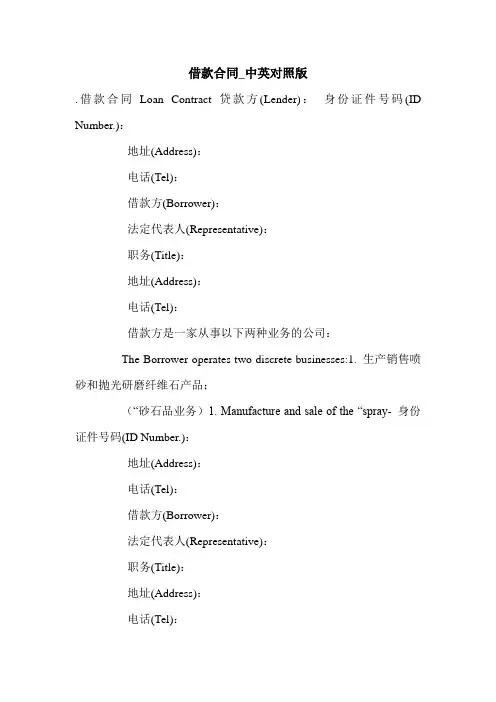
借款合同_中英对照版.借款合同Loan Contract贷款方(Lender):身份证件号码(ID Number.):地址(Address):电话(Tel):借款方(Borrower):法定代表人(Representative):职务(Title):地址(Address):电话(Tel):借款方是一家从事以下两种业务的公司:The Borrower operates two discrete businesses:1. 生产销售喷砂和抛光研磨纤维石产品;(“砂石品业务)1. Manufacture and sale of the “spray- 身份证件号码(ID Number.):地址(Address):电话(Tel):借款方(Borrower):法定代表人(Representative):职务(Title):地址(Address):电话(Tel):借款方是一家从事以下两种业务的公司:The Borrower operates two discrete businesses:1. 生产销售喷砂和抛光研磨纤维石产品;(“砂石品业务)1. Manufacture and sale of the “spray:贰拾捌万美元)US$280,000(Capital Letter: Two Hundred Eighty Thousand US Dollars)贷款方在签订本书面合同之前,已向借款方提供280,000美元贷款。
借款方在此确认已经收到贷款方通过银行转账方式提供的280,000美元贷款。
The Lender agrees to advance the Loan US$280,000 to the Borrower prior to the signing of this Contract. The Borrower hereby confirms that it has received the Loan US$280,000 advanced by the Lender through bank transfer.第二条借款用途Article 2 Scope for Use本合同所约定的贷款仅用于借款方生产销售砂石品业务,不得挪作它用。
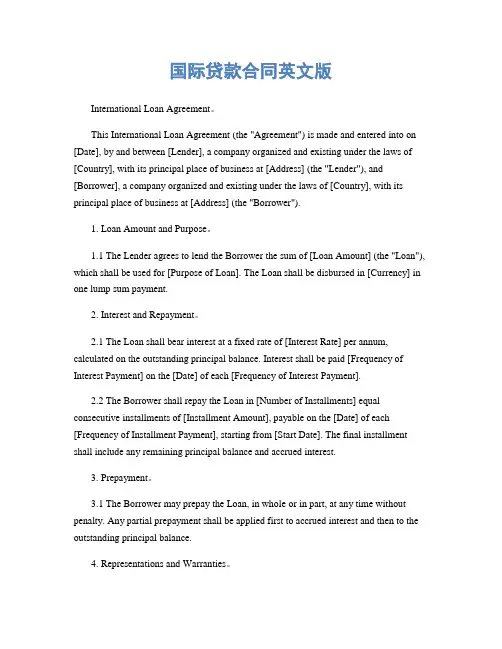
国际贷款合同英文版International Loan Agreement。
This International Loan Agreement (the "Agreement") is made and entered into on [Date], by and between [Lender], a company organized and existing under the laws of [Country], with its principal place of business at [Address] (the "Lender"), and [Borrower], a company organized and existing under the laws of [Country], with its principal place of business at [Address] (the "Borrower").1. Loan Amount and Purpose。
1.1 The Lender agrees to lend the Borrower the sum of [Loan Amount] (the "Loan"), which shall be used for [Purpose of Loan]. The Loan shall be disbursed in [Currency] in one lump sum payment.2. Interest and Repayment。
2.1 The Loan shall bear interest at a fixed rate of [Interest Rate] per annum, calculated on the outstanding principal balance. Interest shall be paid [Frequency of Interest Payment] on the [Date] of each [Frequency of Interest Payment].2.2 The Borrower shall repay the Loan in [Number of Installments] equal consecutive installments of [Installment Amount], payable on the [Date] of each [Frequency of Installment Payment], starting from [Start Date]. The final installment shall include any remaining principal balance and accrued interest.3. Prepayment。
银行借款合同中英文(共5页)--本页仅作为文档封面,使用时请直接删除即可----内页可以根据需求调整合适字体及大小--银行借款合同中英文这是一篇由网络搜集整理的关于银行借款合同(中英文)的文档,希望对你能有帮助。
贷款人:Lender:抵押人:Mortgagor:保证人:Surety :出质人:Pledgeor:为明确各方权利和义务,根据《合同法》、《贷款通则》和其他有关法律、法规,订立本合同。
This Contract is made in line with the Contract Law of the People's Republic of China and The General Provisions of Loans of the People's Bank of China to specify the rights and obligations of parties involved.借贷条款 Loan Borrowing Clause第一条借款金额 Article 1. Amount of loan:第二条借款用途 Article 2. Purpose of loan:第三条借款期限 Article 3. Life of loan借据或贷款凭证是本合同不可分割的组成部分。
借款的实际放款日和还款日以借款人、贷款人双方办理的借据或凭证上所记载的日期为准。
除日期外,借据或凭证其他记载事项如与本合同不一致的,以本合同为准。
A certificate of indebtedness or a loan voucher is an integral part of this Contract. The date of advance and payment due date shall follow the date specified on the certificate of indebtedness or loan voucher . Where there is any inconsistency between the stipulations on the certificate of indebtedness or loan voucher and the Terms and Conditions on this Contract except date, the latter shall prevail.第四条借款划付Article 4 Transferring of loan.借款人办妥借款手续后5个营业日内将全部款项划至借款人指定的账户,划付次数、时间、金额见。
借款合同Loan Agreement本借款合同(下称“本合同”)由以下双方于2015年9月25日在中国北京签署:This Loan Agreement (this "Agreement") is made and entered into by and between the Parties below as of the 25th day of September, 2015, in Beijing, China:(1) AAA控股有限公司(下称“贷款人”),一家依照中华人民共和国香港特别行政区(以下简称“香港”)法律设立和存在的公司,地址为香港XXX;AAA Holdings Limited. ("Lender"), a Company incorporated and existing underthe laws of the Hong Kong Special Administrative Region of the People'sRepublic of China ("Hong Kong"), with its address at XXX, Hong Kong;(2) ________(下称“借款人”),一位中华人民共和国(以下简称“中国”)公民,其身份证号码:_________。
_________ (“Borrower”), a citizen of the PRC with Chinese Identification No.:________.贷款人和借款人以下各称为“一方”,统称为“双方”。
Each of the Lender and the Borrower shall be hereinafter referred to as a "Party" respectively, and as the "Parties" collectively.鉴于:Whereas:1. 借款人持有BBB(下称“借款人公司”)30%的股权权益(下称“借款人股权”);借款人公司是一家在中国深圳注册成立的有限责任公司,其注册资本为人民币10,000,000万元;Borrower, directly or indirectly, holds 30% of equity interests ("Borrower Equity Interest") in BBB Technology Co., Ltd. ("Borrower Company"), which is a limited company duly registered in Shenzhen, China with its registered capital of RMB 10,000,000.00;2. 贷款人拟向借款人提供一笔贷款用于本合同规定的用途。
贷款通则第一章总则第一条为了规范贷款行为,维护借贷双方的合法权益,保证信贷资产的安全,提高贷款使用的整体效益,促进社会经济的持续发展,根据《中华人民共和国中国人民银行法》、《中华人民共和国商业银行法》等有关法律规定,制定本通则。
第二条本通则所称贷款人,系指在中国境内依法设立的经营贷款业务的中资金融机构。
本通则所称借款人,系指从经营贷款业务的中资金融机构取得贷款的法人、其他经济组织、个体工商户和自然人。
本通则中所称贷款系指贷款人对借款人提供的并按约定的利率和期限还本付息的货币资金。
本通则中的贷款币种包括人民币和外币。
第三条贷款的发放和使用应当符合国家的法律、行政法规和中国人民银行发布的行政规章,应当遵循效益性、安全性和流动性的原则。
第四条借款人与贷款人的借贷活动应当遵循平等、自愿、公平和诚实信用的原则。
第五条贷款人开展贷款业务,应当遵循公平竞争、密切协作的原则,不得从事不正当竞争。
第六条中国人民银行及其分支机构是实施《贷款通则》的监管机关。
第二章贷款种类。
第七条自营贷款、委托贷款和特定贷款:自营贷款,系指贷款人以合法方式筹集的资金自主发放的贷款,其风险由贷款人承担,并由贷款人收回本金和利息。
委托贷款,系指由政府部门、企事业单位及个人等委托人提供资金,由贷款人(即受托人)根据委托人确定的贷款对象、用途、金额期限、利率等代为发放、监督使用并协助收回的贷款。
贷款人(受托人)只收取手续费,不承担贷款风险。
特定贷款,系指经国务院批准并对贷款可能造成的损失采取相应补救措施后责成国有独资商业银行发放的贷款。
第八条短期贷款、中期贷款和长期贷款:短期贷款,系指贷款期限在1年以内(含1年)的贷款。
中期贷款,系指贷款期限在1年以上(不含1年)5年以下(含5年)的贷款。
长期贷款,系指贷款期限在5年(不含5年)以上的贷款。
第九条信用贷款、担保贷款和票据贴现:信用贷款,系指以借款人的信誉发放的贷款。
担保贷款,系指保证贷款、抵押贷款、质押贷款。
保证贷款,系指按《中华人民共和国担保法》规定的保证方式以第三人承诺在借款人不能偿还贷款时,按约定承担一般保证责任或者连带责任而发放的贷款。
抵押贷款,系指按《中华人民共和国担保法》规定的抵押方式以借款人或第三人的财产作为抵押物发放的贷款。
质押贷款,系指按《中华人民共和国担保法》规定的质押方式以借款人或第三人的动产或权利作为质物发放的贷款。
票据贴现,系指贷款人以购买借款人未到期商业票据的方式发放的贷款。
第十条除委托贷款以外,贷款人发放贷款,借款人应当提供担保。
贷款人应当对保证人的偿还能力、抵押物、质物的权属和价值以及实现抵押权、质权的可行性进行严格审查。
经贷款审查、评估,确认借款人资信良好,确能偿还贷款的,可以不提供担保。
第三章贷款期限和利率第十一条贷款期限:贷款限期根据借款人的生产经营周期、还款能力和贷款人的资金供给能力由借贷双方共同商议后确定,并在借款合同中载明。
自营贷款期限最长一般不得超过10年,超过10年应当报中国人民银行备案。
票据贴现的贴现期限最长不得超过6个月,贴现期限为从贴现之日起到票据到期日止。
第十二条贷款展期:不能按期归还贷款的,借款人应当在贷款到期日之前,向贷款人申请贷款展期。
是否展期由贷款人决定。
申请保证贷款、抵押贷款、质押贷款展期的,还应当由保证人、抵押人、出质人出具同意的书面证明。
已有约定的,按照约定执行。
短期贷款展期期限累计不得超过原贷款期限;中期贷款展期期限累计不得超过原贷款期限的一半;长期贷款展期期限累计不得超过3年。
国家另有规定者除外。
借款人未申请展期或申请展期末得到批准,其贷款从到期日次日起,转入逾期贷款账户。
第十三条贷款利率的确定:贷款人应当按照中国人民银行规定的贷款利率的上下限,确定每笔贷款利率,并在借款合同中载明。
第十四条贷款利息的计收:贷款人和借款人应当按借款合同和中国人民银行有关计息规定按期计收或交付利息。
贷款的展期期限加上原期限达到新的利率期限档次时,从展期之日起,贷款利息按新的期限档次利率计收。
逾期贷款按规定计收罚息。
第十五条贷款的贴息:根据国家政策,为了促进某些产业和地区经济的发展,有关部门可以对贷款补贴利息。
对有关部门贴息的贷款,承办银行应当自主审查发放,并根据本通则有关规定严格管理。
第十六条贷款停息、减息、缓息和免息:除国务院决定外,任何单位和个人无权决定停息、减息、缓息和免息。
贷款人应当依据国务院决定,按照职责权限范围具体办理停息、减息、缓息和免息。
第四章借款人第十七条借款人应当是经工商行政管理机关(或主管机关)核准登记的企(事)业法人、其他经济组织、个体工商户或具有中华人民共和国国籍的具有完全民事行为能力的自然人。
借款人申请贷款,应当具备产品有市场、生产经营有效益、不挤占挪用信贷资金、恪守信用等基本条件,并且应当符合以下要求:一、有按期还本付息的能力,原应付贷款利息和到期贷款已清偿;没有清偿的,已经做了贷款人认可的偿还计划。
二、除自然人和不需要经工商部门核准登记的事业法人外,应当经过工商部门办理年检手续。
三、已开立基本账户或一般存款账户。
四、除国务院规定外,有限责任公司和股份有限公司对外股本权益性投资累计额未超过其净资产总额的50%。
五、借款人的资产负债率符合贷款人的要求。
六、申请中期、长期贷款的,新建项目的企业法人所有者权益与项目所需总投资的比例不低于国家规定的投资项目的资本金比例。
第十八条借款人的权利:一、可以自主向主办银行或者其他银行的经办机构申请贷款并依条件取得贷款;二、有权按合同约定提取和使用全部贷款;三、有权拒绝借款合同以外的附加条件;四、有权向贷款人的上级和中国人民银行反映、举报有关情况;五、在征得贷款人同意后,有权向第三人转让债务。
第十九条借款人的义务:一、应当如实提供贷款人要求的资料(法律规定不能提供者除外),应当向贷款人如实提供所有开户行、账号及存贷款余额情况,配合贷款人的调查、审查和检查;二、应当接受贷款人对其使用信贷资金情况和有关生产经营、财务活动的监督;三、应当按借款合同约定用途使用贷款;四、应当按借款合同约定及时清偿贷款本息;五、将债务全部或部分转让给第三人的,应当取得贷款人的同意;六、有危及贷款人债权安全情况时,应当及时通知贷款人,同时采取保全措施。
第二十条对借款人的限制:一、不得在一个贷款人同一辖区内的两个或两个以上同级分支机构取得贷款。
二、不得向贷款人提供虚假的或者隐瞒重要事实的资产负债表、损益表等。
三、不得用贷款从事股本权益性投资,国家另有规定的除外。
四、不得用贷款在有价证券、期货等方面从事投机经营。
五、除依法取得经营房地产资格的借款人以外,不得用贷款经营房地产业务;依法取得经营房地产资格的借款人,不得用贷款从事房地产投机。
六、不得套取贷款用于借贷牟取非法收入。
七、不得违反国家外汇管理规定使用外币贷款。
八、不得采取欺诈手段骗取贷款。
第五章贷款人第二十一条贷款人必须经中国人民银行批准经营贷款业务,持有中国人民银行颁发的《金融机构法人许可证》或《金融机构营业许可证》,并经工商行政管理部门核准登记。
第二十二条贷款人的权利:根据贷款条件和贷款程序自主审查和决定贷款,除国务院批准的特定贷款外,有权拒绝任何单位和个人强令其发放贷款或者提供担保。
一、要求借款人提供与借款有关的资料;二、根据借款人的条件,决定贷与不贷、贷款金额、期限和利率等;三、了解借款人的生产经营活动和财务活动;四、依合同约定从借款入账户上划收贷款本金和利息;五、借款人未能履行借款合同规定义务的,贷款人有权依合同约定要求借款人提前归还贷款或停止支付借款人尚未使用的贷款;六、在贷款将受或已受损失时,可依据合同规定,采取使贷款免受损失的措施。
第二十三条贷款人的义务:一、应当公布所经营的贷款的种类、期限和利率,并向借款人提供咨询。
二、应当公开贷款审查的资信内容和发放贷款的条件。
三、贷款人应当审议借款人的借款申请,并及时答复贷与不贷。
短期贷款答复时间不得超过1个月,中期、长期贷款答复时间不得超过六个月;国家另有规定者除外。
四、应当对借款人的债务、财务、生产、经营情况保密,但对依法查询者除外。
第二十四条对贷款人的限制:一、贷款的发放必须严格执行《中华人民共和国商业银行法》第三十九条关于资产负债比例管理的有关规定,第四十条关于不得向关系人发放信用贷款、向关系人发放担保贷款的条件不得优于其他借款人同类贷款条件的规定。
二、借款人有下列情形之一者,不得对其发放贷款:(一)不具备本通则第四章第十七条所规定的资格和条件的;(二)生产、经营或投资国家明文禁止的产品、项目的;(三)违反国家外汇管理规定的;(四)建设项目按国家规定应当报有关部门批准而未取得批准文件的;(五)生产经营或投资项目未取得环境保护部门许可的;(六)在实行承包、租赁、联营、合并(兼并)、合作、分立、产权有偿转让、股份制改造等体制变更过程中,未清偿原有贷款债务、落实原有贷款债务或提供相应担保的;(七)有其他严重违法经营行为的。
三、未经中国人民银行批准,不得对自然人发放外币币种的贷款。
四、自营贷款和特定贷款,除按中国人民银行规定计收利息之外,不得收取其他任何费用;委托贷款,除按中国人民银行规定计收手续费之外,不得收取其他任何费用。
五、不得给委托人垫付资金,国家另有规定的除外。
六、严格控制信用贷款,积极推广担保贷款。
第六章贷款程序第二十五条贷款申请:借款人需要贷款,应当向主办银行或者其他银行的经办机构直接申请。
借款人应当填写包括借款金额、借款用途、偿还能力及还款方式等主要内容的《借款申请书》并提供以下资料:一、借款人及保证人基本情况;二、财政部门或会计(审计)事务所核准的上年度财务报告,以及申请借款前一期的财务报告;三、原有不合理占用的贷款的纠正情况;四、抵押物、质物清单和有处分权人的同意抵押、质押的证明及保证人拟同意保证的有关证明文件;五、项目建议书和可行性报告;六、贷款人认为需要提供的其他有关资料。
第二十六条对借款人的信用等级评估:应当根据借款人的领导者素质、经济实力、资金结构、履约情况、经营效益和发展前景等因素,评定借款人的信用等级。
评级可由贷款人独立进行,内部掌握,也可由有权部门批准的评估机构进行。
第二十七条贷款调查:贷款人受理借款人申请后,应当对借款人的信用等级以及借款的合法性、安全性、盈利性等情况进行调查,核实抵押物、质物、保证人情况,测定贷款的风险度。
第二十八条贷款审批:贷款人应当建立审贷分离、分级审批的贷款管理制度。
审查人员应当对调查人员提供的资料进行核实、评定,复测贷款风险度,提出意见,按规定权限报批。
第二十九条签订借款合同:所有贷款应当由贷款人与借款人签订借款合同。
借款合同应当约定借款种类,借款用途、金额、利率,借款期限,还款方式,借、贷双方的权利、义务,违约责任和双方认为需要约定的其他事项。